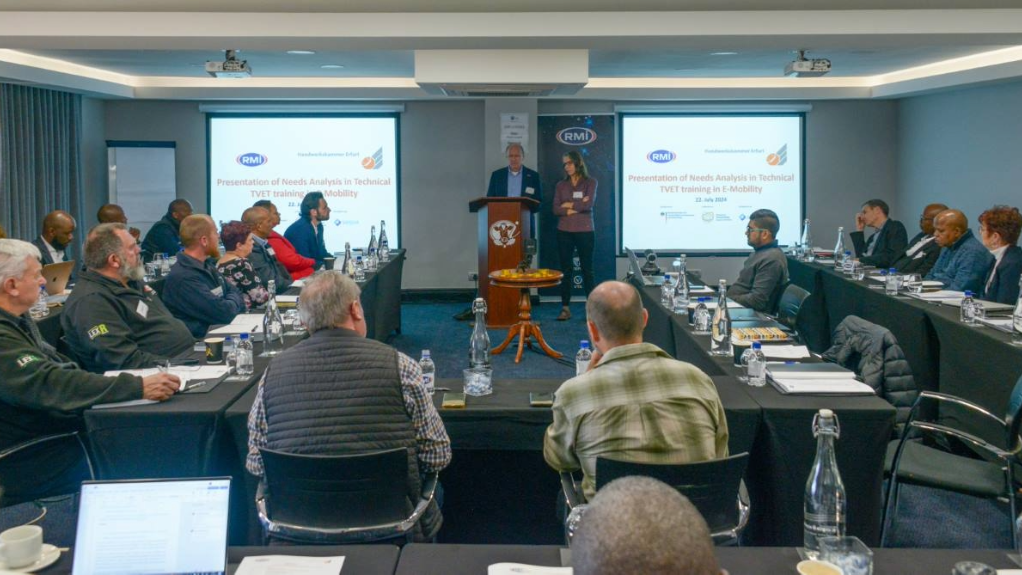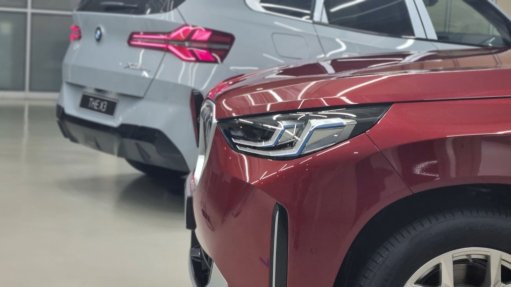Skills shortage a concern as e-mobility set to shape local automotive sector



SKILLS DEVELOPMENT In addition to skills courses, the RMI is rolling out the Artisan Recognition of Prior Learning initiative
IPELENG MABUSELA This is part of our push to professionalise the sector and improve the quality of services
The South African automotive industry – a significant contributor to South Africa’s GDP – faces critical challenges, such as a persistent decline in qualified artisans, which threatens to disrupt the sector’s operations, while the global transition to electric vehicles (EVs) demands urgent preparation.
The Retail Motor Industry Organisation (RMI), representing 8 500 member businesses in the automotive aftermarket, is addressing these issues through targeted interventions in skills development and vocational training.
Between 2019 and 2023, qualified artisans in key trades in the automotive sector, such as motorcycle mechanics, spray painters and automotive machinists, experienced a significant decline, with reductions as high as 8.3%.
RMI strategy and corporate support CEO Ipeleng Mabusela expresses concern about this trend, noting that “despite the National Development Plan’s target of producing 30 000 artisans a year by 2030, current trajectories fall significantly short”.
He adds that, given that the aftermarket segment contributes 2.1% to GDP and employs around 300 000 people, reversing this decline is essential, not just for economic growth but also for road safety.
Artisans are responsible for maintaining critical vehicle components, including brakes, steering and suspension systems, which directly impact on safety.
To combat these challenges, the RMI has secured R23.5-million from educational institution Manufacturing, Engineering and Related Services Sector Education and Training Authority (merSETA) for short skills courses.
These courses target areas such as diagnostics, electrical systems and customer service, equipping participants with competencies necessary for a modern automotive industry.
According to Mabusela, training has already started in Gauteng, with over 250 learners completing modules. In 2025, the RMI hopes to implement a nationwide roll-out.
He adds that the upcoming introduction of an electromobility qualification, recognised under South Africa’s National Qualifications Framework, will formalise training and standardise practices.
“This will ensure that qualified professionals are recognised and equipped to meet the demands of the evolving automotive landscape,” he says.
In addition to skills courses, the RMI is rolling out the Artisan Recognition of Prior Learning initiative, targeting 2 500 candidates.
Mabusela describes the initiative as “a collaborative effort to align with national strategies, increase the number of registered artisans, and bolster the sector’s competitiveness”.
He highlights the need for decentralised trade test centres, especially in regions such as Gauteng and the Eastern Cape, to improve access for candidates.
Meanwhile, RMI national training director Louis van Huyssteen says that the RMI has appointed nine national training advisers to support member businesses. Their role is to design tailored training programmes that align with industry needs and to guide members on learnerships, apprenticeships and skills programmes.
“This is part of our push to professionalise the sector and improve the quality of services,” he tells Engineering News.
However, the global shift to EVs poses additional challenges for the South African industry, with Van Huyssteen saying that over 14-million EVs were sold worldwide in 2023, marking a 35% increase from the previous year.
Locally, the Department of Trade, Industry and Competition’s EV White Paper emphasises the need for legislative and industrial support to stimulate consumer demand and prepare the workforce.
Mabusela sees this transition as an opportunity to diversify the workforce, particularly by attracting more women and youth.
“The potential for growth in our sector is immense, but success hinges on training and skills development. We need industry-wide recognition of qualifications and legislative frameworks that drive consumer demand,” he says.
The RMI’s partnerships with global players are instrumental in this preparation, he adds, highlighting collaborations with the German Chamber of Crafts, Handwerkskammer Erfurt (HWK Erfurt), and automotive manufacturer Porsche AG, which he says has enabled targeted training for technical and vocational education and training (TVET) college lecturers.
“Our pilot projects at Eastcape Midlands and Tshwane South TVET colleges, supported by Porsche AG and HWK Erfurt, have equipped lecturers with hands-on experience in EV technology. This is a vital step in preparing the next generation of technicians,” Mabusela highlights.
Further, the SpannerTorque platform, launched by RMI constituent association, the Motor Industry Workshop Association (Miwa), in collaboration with industry stakeholders such as engineering company Bosch and integrated energy company TotalEnergies, provides members with essential technical training and updates. Van Huyssteen describes the platform as “an invaluable resource for staying ahead of industry trends and ensuring members are equipped to adapt to rapid technological advancements”.
Efforts to attract young talent into the sector are also under way. For example, the Motor Mech competition, initiated by Miwa, offers high school students exposure to practical automotive skills.
Launched in Gqeberha in 2019, the competition has since expanded to several regions, with plans to include Bloemfontein and George in 2025.
“By engaging young talent early, we can bridge the gap between education and industry, ensuring a pipeline of skilled professionals for the future,” Mabusela emphasises.
Despite these efforts, challenges persist, and Van Huyssteen acknowledges that “outdated curricula and under-resourced training centres continue to hinder progress”.
However, he says that RMI’s partnerships with merSETA, the Quality Council for Trades and Occupations, the Department of Higher Education and Training’s National Artisan Development Chief Directorate team and others aim to modernise training and ensure alignment with industry needs.
Article Enquiry
Email Article
Save Article
Feedback
To advertise email advertising@creamermedia.co.za or click here
Press Office
Announcements
What's On
Subscribe to improve your user experience...
Option 1 (equivalent of R125 a month):
Receive a weekly copy of Creamer Media's Engineering News & Mining Weekly magazine
(print copy for those in South Africa and e-magazine for those outside of South Africa)
Receive daily email newsletters
Access to full search results
Access archive of magazine back copies
Access to Projects in Progress
Access to ONE Research Report of your choice in PDF format
Option 2 (equivalent of R375 a month):
All benefits from Option 1
PLUS
Access to Creamer Media's Research Channel Africa for ALL Research Reports, in PDF format, on various industrial and mining sectors
including Electricity; Water; Energy Transition; Hydrogen; Roads, Rail and Ports; Coal; Gold; Platinum; Battery Metals; etc.
Already a subscriber?
Forgotten your password?
Receive weekly copy of Creamer Media's Engineering News & Mining Weekly magazine (print copy for those in South Africa and e-magazine for those outside of South Africa)
➕
Recieve daily email newsletters
➕
Access to full search results
➕
Access archive of magazine back copies
➕
Access to Projects in Progress
➕
Access to ONE Research Report of your choice in PDF format
RESEARCH CHANNEL AFRICA
R4500 (equivalent of R375 a month)
SUBSCRIBEAll benefits from Option 1
➕
Access to Creamer Media's Research Channel Africa for ALL Research Reports on various industrial and mining sectors, in PDF format, including on:
Electricity
➕
Water
➕
Energy Transition
➕
Hydrogen
➕
Roads, Rail and Ports
➕
Coal
➕
Gold
➕
Platinum
➕
Battery Metals
➕
etc.
Receive all benefits from Option 1 or Option 2 delivered to numerous people at your company
➕
Multiple User names and Passwords for simultaneous log-ins
➕
Intranet integration access to all in your organisation



















